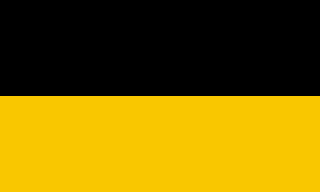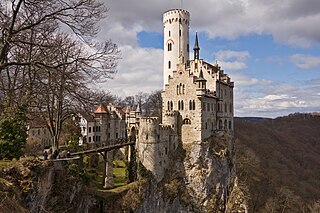Liechtenstein is a country in Europe.
Lichtenstein or Liechtenstein may also refer to:
- House of Liechtenstein, the ruling family of Liechtenstein
Liechtenstein is a country in Europe.
Lichtenstein or Liechtenstein may also refer to:

Political identity came to the territory now occupied by the Principality of Liechtenstein in 814, with the formation of the subcountry of Lower Rhætia. Liechtenstein's borders have remained unchanged since 1434, when the Rhine established the border between the Holy Roman Empire and the Swiss cantons.

Baden-Württemberg, commonly shortened to BW or BaWü, is a German state in Southwest Germany, east of the Rhine, which forms the southern part of Germany's western border with France. With more than 11.07 million inhabitants as of 2019 across a total area of nearly 35,752 km2 (13,804 sq mi), it is the third-largest German state by both area and population. As a federated state, Baden-Württemberg is a partly-sovereign parliamentary republic. The largest city in Baden-Württemberg is the state capital of Stuttgart, followed by Mannheim and Karlsruhe. Other major cities are Freiburg im Breisgau, Heidelberg, Heilbronn, Pforzheim, Reutlingen, Tübingen, and Ulm.

The Federal Republic of Germany, as a federal state, consists of sixteen states. Berlin, Hamburg and Bremen are called Stadtstaaten ("city-states"), while the other thirteen states are called Flächenländer and include Bavaria, Saxony, and Thuringia which describe themselves as Freistaaten.
Falkenstein or Falckenstein may refer to:
Schönberg may refer to:
Schwarzenberg may refer to:
Kirchberg commonly refers to:
Auerbach, German for "meadow-brook", may refer to the following:

Lichtenstein Castle is a privately owned Gothic Revival castle located in the Swabian Jura of southern Germany. It was designed by Carl Alexander Heideloff and its name means "shining stone" or "bright stone". The castle overlooks the Echaz valley near Honau, Reutlingen in the state of Baden-Württemberg. The modern castle was inspired by Wilhelm Hauff's 1826 novel Lichtenstein and was built in 1840–1842. The ruins of an older medieval castle are a few hundred meters away.
Hohenberg may refer to:
Fürstenberg may refer to:
Oberndorf may refer to the following places:
Silberberg is German for "Silver Mountain" or "Silver Hill" and may refer to:

Southern Germany is a region of Germany that included the areas in which Upper German dialects are spoken, which includes the stem duchies of Bavaria and Swabia.
Frankenburg is German for "Frankish castle" and may refer to:
Heiligenberg is a municipality and a village in the Bodensee district, Baden-Württemberg, Germany.
A burgstall is a German term referring to a castle of which so little is left that its appearance cannot effectively be reconstructed.
Ochsenkopf, German for "ox's head", may refer to:
Lichtenstein Castle may refer to the following castles:

A Jugendburg, sometimes referred to in English as a youth castle, is a mediaeval castle in German-speaking countries that was converted during the 20th century into a public community centre or educational facility for young people. The sponsors of the original youth castles came mainly from the Wandervogel and Pfadfinder movement, or were at least linked to the youth movement.